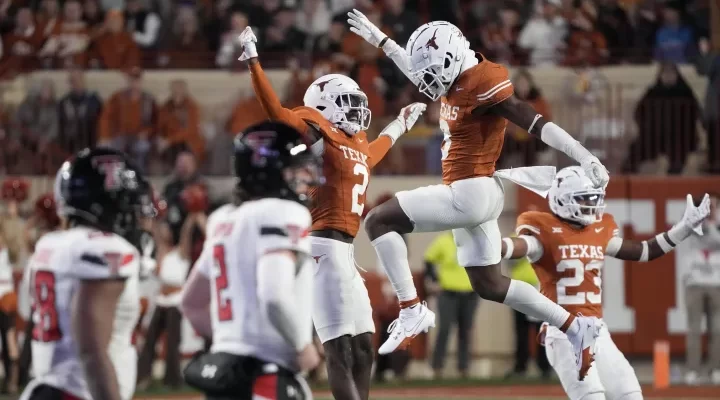RJ Young Defends Quinn Ewers Amid Harsh Criticism, Suggests Arch Manning Never Commits to Texas Without Him
The debate around Texas quarterback Quinn Ewers has reached a boiling point, with sports analysts, fans, and college football insiders all offering up their takes following the Longhorns’ College Football Playoff run. While some have questioned Ewers’ consistency and leadership during Texas’ return to the national stage, one voice has emerged in fierce defense of the junior quarterback—FOX Sports analyst RJ Young. In a passionate segment, Young called out the critics targeting Ewers and made a bold statement: without Ewers, Texas never lands five-star phenom Arch Manning. And without Manning, the trajectory of the program looks very different.
For Texas football, the resurgence under Steve Sarkisian has been both fast and heavily scrutinized. After more than a decade of mediocrity, the Longhorns finally found their way back to relevance in 2023 and punched their ticket to the College Football Playoff in 2024. That return came with plenty of spotlight, and naturally, plenty of blame when the team fell short of a national title. At the center of it all stood Quinn Ewers—polarizing, immensely talented, and now the subject of divisive opinions.
Some fans and commentators were quick to point fingers at Ewers for Texas’ inability to finish strong during the playoff run. They cited his missed throws, moments of indecision, and a perceived inability to elevate the offense during key stretches. Others pointed to his injury history and questioned whether he was the right quarterback to lead the Longhorns into their SEC era. The criticism has grown louder during the offseason, with transfer rumors swirling and backup quarterbacks getting more attention during spring practices.
But RJ Young wasn’t having any of it. In a fiery monologue on his national show, he dismantled what he called “revisionist history” regarding Ewers’ impact on the program. Young emphasized that it was Ewers’ commitment and early presence in the program that laid the foundation for Texas’ resurgence and ultimately helped recruit the next generation of talent—most notably, Arch Manning.
“People forget how huge Quinn Ewers’ decision was when he transferred to Texas,” Young said. “That was the first domino. You don’t get Arch Manning if Quinn Ewers isn’t already in the building. That’s just facts. Arch wanted to sit behind a guy who could show him what it takes to be a college quarterback. That mattered to him and his family.”
Ewers, who originally committed to Texas before reclassifying and enrolling at Ohio State, returned to Austin after one season buried on the Buckeyes’ depth chart. That return was met with fanfare, hype, and enormous expectations. Ewers was seen as the savior of Texas football—a quarterback prodigy with elite arm talent and an aura of stardom the program hadn’t seen since Colt McCoy.
While his road hasn’t been perfect, Ewers’ impact has been undeniable. He played through injuries, took heat during early growing pains, and still led Texas to their best season in over a decade. Under his leadership, the Longhorns beat Alabama on the road, claimed a Big 12 title, and came within a few plays of the national championship game.
Yet, as Young pointed out, Ewers doesn’t get enough credit for what he built behind the scenes. His presence stabilized the quarterback room. He helped change the culture. And he sent a message to other top recruits that Texas was serious again.
“Arch Manning doesn’t come to a broken program,” Young continued. “He comes to a place that’s stable, with a coaching staff he trusts and a quarterback he respects. You don’t land a Manning without showing progress. Quinn Ewers was that progress.”
For those unfamiliar with Arch Manning’s recruitment, it was one of the most closely watched processes in recent memory. As the nephew of NFL legends Peyton and Eli Manning, Arch carried the weight of a dynasty. He was pursued by every major program in the country—Alabama, Georgia, LSU, Ole Miss, and Clemson, to name a few. But in the end, it was Texas that secured his commitment. That commitment shocked many, but insiders pointed to Sarkisian’s system, the offensive vision, and Ewers’ influence as key factors.
Manning’s decision sent shockwaves through college football and elevated Texas’ status as a national power once again. His presence on the roster attracted other blue-chip recruits and solidified the Longhorns as a legitimate contender heading into their SEC move. Still, for all the celebration around Arch, many forget that it was Ewers who paved the way.
Despite his accomplishments, Ewers has remained an enigmatic figure. He’s not particularly vocal in the media. He rarely engages in controversy. Instead, he’s focused on football and development. For some, that quiet demeanor has been mistaken for indifference. But those inside the program have consistently praised his work ethic and leadership, especially in mentoring younger players like Manning and freshman phenom Trey Owens.
RJ Young also pointed out that the pressure Ewers faced was unlike anything most quarterbacks deal with. “This kid had the weight of Texas football history on his shoulders,” Young said. “He was expected to win immediately, carry a massive brand, live up to five-star expectations, and mentor the most famous high school quarterback since Trevor Lawrence. And he did it all while staying humble.”
Young didn’t deny that Ewers had rough moments. Every quarterback does. But he emphasized that progress isn’t always linear and that judging a player solely by the outcome of a playoff game ignores the broader impact they’ve had on a program.
“You want to talk about legacy? Look at where Texas was before Quinn Ewers and look at where they are now,” Young said. “That’s his legacy. He made them relevant again.”
In 2025, Texas enters the SEC with perhaps its most complete roster in over 15 years. Manning is developing. The defense is deep and athletic. The offensive line is built to withstand the rigors of SEC play. And the quarterback battle between Ewers and Manning will define the season’s narrative. Yet even if Manning ends up taking the reins, his story is forever linked to Ewers’ presence and guidance.
As fans debate who should start, or whether the CFP disappointment falls at Ewers’ feet, RJ Young’s defense is a reminder that college football is bigger than one game or one stat line. It’s about culture shifts, long-term development, and laying foundations. And in that respect, Ewers has already won.
His story at Texas may still be unfinished. With one more season of eligibility, the quarterback room remains fluid. But whether he stays another year or moves on to the NFL, Ewers will have left a lasting mark on a program that desperately needed a face to lead them out of the wilderness. The Longhorns’ climb back to the top began with his arrival. And as Young emphasized, it’s time people remembered that.
So, while critics look for scapegoats and point fingers after playoff losses, RJ Young’s words echo louder than any stat sheet or message board. “No Quinn Ewers? No Arch Manning. No Arch Manning? No resurgence. Period.”



